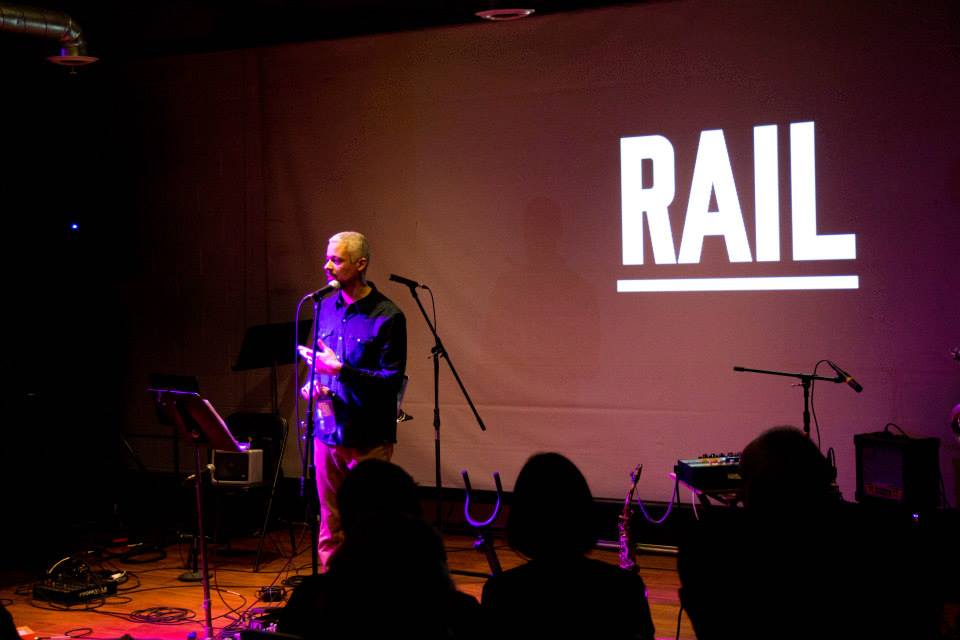
Eclecticism is the rule of the game for most new music concerts these days, as artists and musicians continue to dissolve boundaries and differences between the rituals of classical, jazz and popular music performance. Thin Edge New Music Collective has primarily dedicated their concerts to new contemporary classical music, though their most recent concert, onomatopoeia demonstrated a surprising flexibility in programming and performance. The results of such diversity will generate outsider interest towards these artists and composers, but the lack of consistency can also be frustrating to some who appreciate the purity of traditional contemporary-classical dialogue and ritual.
The programme featured a number of guest artists, including guest vocal ensemble GREX, guest conductor, Patrick Murray, and guest performers Jason Sharp and Kaie Kellough, whose extra presence managed to completely fill the well-attended Arrayspace venue on Thursday night.
The concert opened with Udo Kasemets’ open score piece Primeku (2004), a curious piece involving cyclical repetitions of gradually accumulating constellations of sounds, provided by Thin Edge’s core musicians. Most of the success of the piece derived from the creativity of instrumentation utilized by the ensemble, which included dozens of percussion instruments, cello, violin, piano and saxophone.
Next on the concert was Simon Steen-Andersen’s brief oddity, Next to Beside Besides #2 + #4 + #6 +#7 (2003-2005), which was performed with exciting dynamism by Cheryl Duvall, Nathan Petitpas, Chelsea Shanoff and Ilana Waniuk, on piano, snare drum, saxophone and violin, respectively.
The GREX vocal ensemble followed with a solo set of vocal pieces. GREX is a welcomed addition to Toronto’s new music scene, filling a gap that has never properly been filled by any vocal group in Toronto, since many choral groups choose instead to offer historically balanced programs or (sadly common) no commissioned new music whatsoever. The group was perhaps a bit too heavy-handed in asserting their unorthodoxy, opening with Meridith Monk’s Hocket and Braid 2 and Core Chant from ‘Mercy’ (2002), Moondog’s All is Loneliness, and a traditional shape note hymn. Later, however, the ensemble displayed a stronger flexibility within the next two pieces performed with the Thin Edge Ensemble, Tova Kardonne’s Macrowave (world premiere) and Elisha Denburg’s Just So Stories (world premiere). The choir hummed, cooed and murmured throughout Macrowave, which was built on a number of instrumental and vocal ostinatos that unfortunately dissolved into a bland forgetfulness upon completion.
The second piece, Elisha Denburg’s Just So Stories, sets the memorable children’s texts by Rudyard Kipling. Particularly arresting was Denberg’s evocative vocal writing, which gave an almost disconcerting vibrancy to the characters depicted in Kipling’s tales: GREX squeaked innocently to embody a baby elephant in the tale, “The Elephant’s Child” and bellowed threateningly to depict a hungry whale in “How the Whale Got His Throat”.
The next three pieces were the result of a collaboration between saxophonist and improviser Jason Sharp and “word-sound systemizer” Kaie Kellough.
It is rare in a classical concert to experience music of such a visceral nature, as all three pieces explored and deconstructed the essences of language and sound. Sharp’s bass saxophone provided drones and feedback-like distortions of sound, as Kellough explored, distorted, and pulled apart words and their meaning, occasionally reducing them to their original phonological sounds as during the final piece RAIL, all performed with a rhythmic intentionality. The result created massive arches of musical tension, as language and musical syntax fragmented and reassembled.
Tyler Versluis
+++
Tyler Versluis is a Toronto-based composer, pianist, and organist who has recently completed graduate studies at the University of Toronto. Recently, Tyler was guest composer for Toronto’s Toy Piano Composers and composer-in-residence for gamUT new music ensemble. As a pianist, he performs regularly with gamUT and freelances as an organist in the Toronto and Niagara region.
- OPEN LETTER | Christina Petrowska Quilico Remembers Pierre Boulez - January 7, 2016
- Op-ed: The Compositional Voice and the Need to Please - September 4, 2014
- Onomatopoeia: The Thin Edge New Music Collective Sounds Off - May 10, 2014



